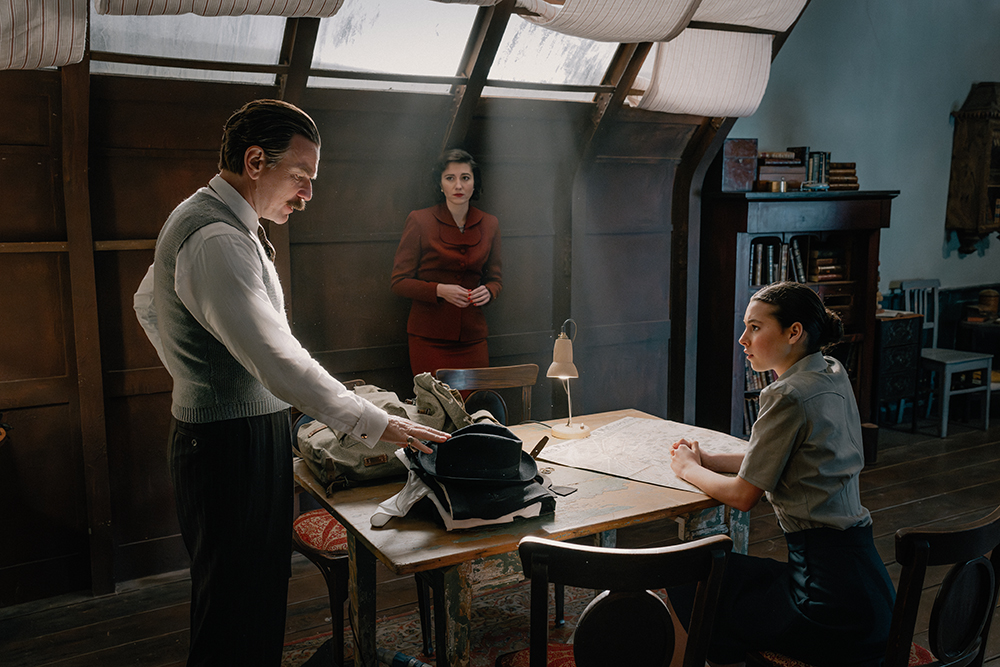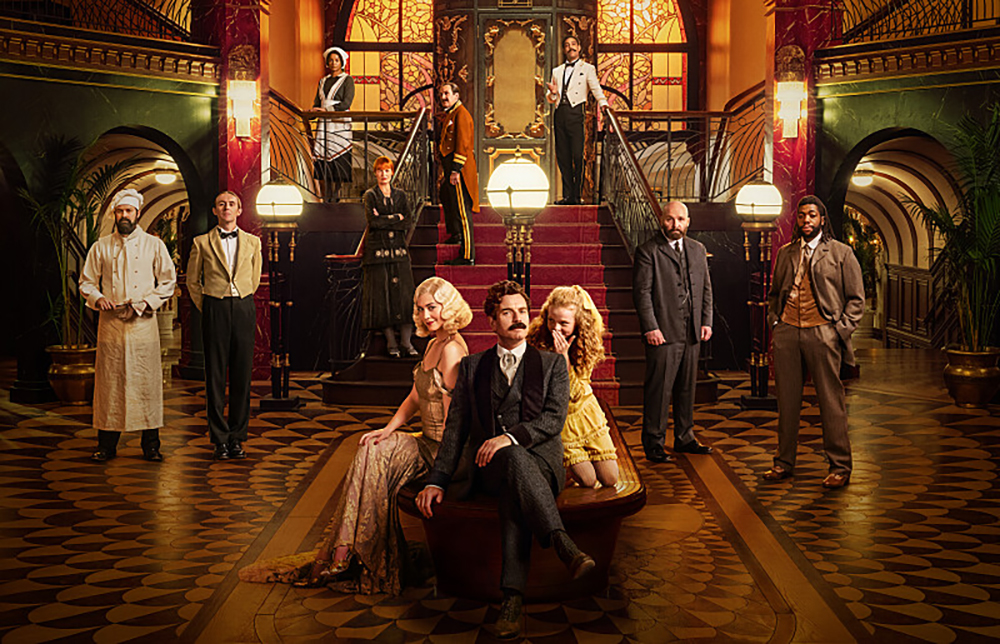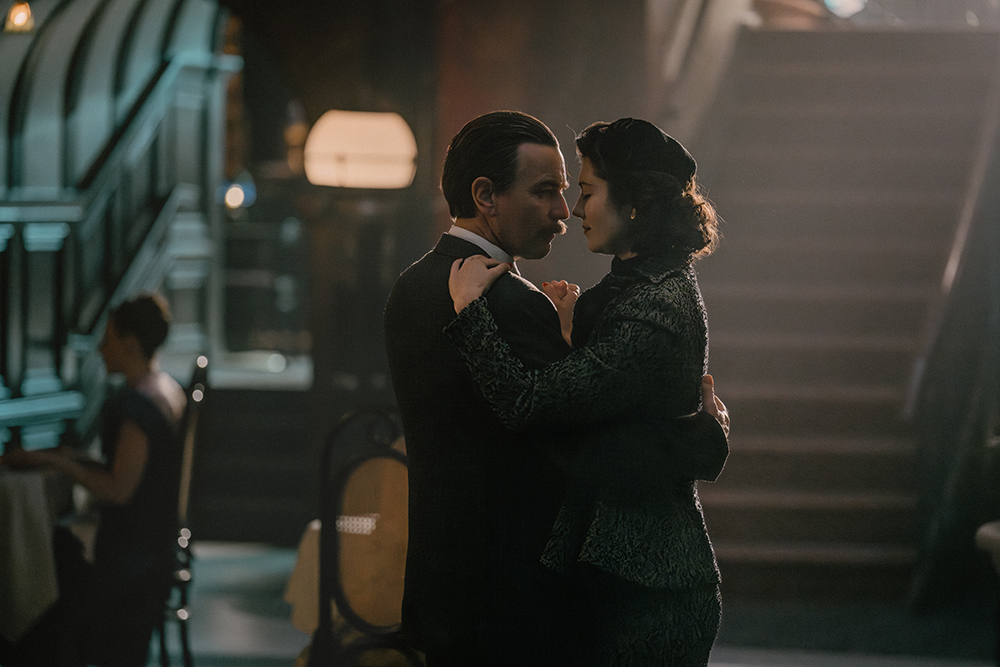
Ewan McGregor as Count Rostov, Mary Elizabeth Winstead as Anna Urbanova and Billie Gadsdon as Sofia in "A Gentleman in Moscow." (Ben Blackall/Paramount+ with Showtime)
I have read A Gentleman in Moscow by Amor Towles no less than seven times. Rumors of a movie or television series have swirled since the book's triumphant debut in 2016; however, as any dedicated reader can confirm, an adaptation to screen inspired me with equal parts dread and thrill.
The story follows Count Alexander Ilyich Rostov, a Russian aristocrat placed under house arrest in the Metropol Hotel during the Bolshevik revolution. Spanning 32 years of his life, and a tumultuous time in Russian history, the narrative chronicles the Count's pursuit of purpose, retention of hope and the creation of his chosen family, all within the walls of the Metropol.
The recently aired television mini-series, starring Ewan McGregor and directed by Sam Miller and Sarah O'Gorman, weaves Rostov's years spent at the Metropol hotel into a tapestry of key events while retaining the eccentric and sentimental occurrences which bolster the plot. The screen lends itself beautifully to the Count's discovery of the seemingly ever-growing nature of the hotel. He learns "there are doors behind doors and rooms behind rooms" as he plumbs the depths and heights of all the hotel has to offer.
Advertisement
Music is an additional medium utilized extraordinarily well within the series. Setting a somber, tense tone, the instrumental music — both classical and folk — conveys the dread and fear around the Count's social status as an aristocrat in Bolshevik Russia. The plot's pacing holds space for silence and anticipation, adeptly articulating anxiety without words or even sound.
This pervasive unease shifts away from the book's lighter tone and is primarily a consequence of the political focus of the show. Though the political setting was both felt and deeply relevant within the novel, the television series brings politics to the forefront in plot and tone. The show highlights the elements of uncertainty and fear around politics in Russia at that time, both for aristocrats and working-class citizens. While the plot of the book includes many lighthearted and humorous moments, the series sings the same narrative song — but in a minor key.
Even with its dimmer tone, discovering light amidst darkness remains a theme in the television series, staying true to the source material. The light feels nearly snuffed at various points throughout both the book and show as the Count wrestles with his sense of purpose while under house arrest and watches his country devolve into what he calls a "madhouse." But even when the weight of the revolution nearly eclipses all light, Rostov finds that hope flares anew, articulating his belief that "if one does not master one's circumstances, one is mastered by them."

From left to right, Bjorn Hlynur Haraldsson as Emile, John Heffernan as The Bishop, Leah Harvey as Mariana, Anastasia Hille as Olga, Daniel Cerqueira as Vasily, Mary Elizabeth Winstead as Anna Urbanova, Ewan McGregor as Count Rostov, Alexa Goodall as Nina, Lyes Salem as Andrey, Johnny Harris as Osip, Fehinti Balogun as Mishka in "A Gentleman in Moscow." (Jason Bell/Paramount+ with Showtime)
Throughout the television series, many characters express their emotions more passionately and externally than in the book. Without the novel's inner monologue to chronicle the Count's feelings of defeat, his outward show of frayed nerves and despair sets the scene for his descent into depression and subsequent phoenix-like rise back into a man of purpose.
The use of expressive emotions was not the only shift created in Rostov's character for the series. In the book the Count is self-assured, respectable and deeply principled; in contrast, McGregor's rendition opens the show with a more endearingly bumbling charm. Early in the series the young Rostov comes across as nearly petulant and petty in instances where the plot deviates from the book. The Count of the novel chooses his course based on an unwavering sense of gentlemanly principles. McGregor's Count appears more swayed by the political climate and lacks the internal compass of goodness and conviction evident in the book.
As Rostov ages in the series, he grows both in wisdom and loving concern for others through the women in his life who serve as razor sharp blades to hone his character development. A motif shared by the book and mini-series is the importance of community for a full and purposeful life. The relationships formed between the Count and the three most important women in his life — Nina Kulikova, Anna Urbanova and Sofia — provide levity and a window into the more tender, compassionate side of Rostov.
As the Count muses on the conveniences of life that he once enjoyed as a gentleman of leisure, he states that in life "it's the inconveniences that have mattered most to me."
Nina and Anna each mirror their book's counterparts in their vivacious natures, quick minds and devotion to the Count. Anna is portrayed expertly by Mary Elizabeth Winstead and the chemistry between the characters is electric, which should come as no surprise considering Winstead and McGregor are married.
The Count's adopted daughter, Sofia, becomes an integral fixture in the Metropol Hotel and solidifies the connections between the various members of the hotel staff, Anna and Rostov into what she claims as her family. The young Sofia, played by Billie Gadsdon, is heartbreakingly true to the book: a child who could have easily fallen through the cracks of the revolution were it not for the Count and her adopted family within the hotel. The show matches the book well in recounting Rostov's foibles and victories in parenting Sofia while also deepening his character as a loving and devoted father.
In addition to the importance of community, the search for happiness, purpose and light remains consistently evident throughout both the series and novel. The joy found when intermingling resilience with hope is perfectly encapsulated in one of my favorite lines from the book and delivered flawlessly in the show. As the Count muses on the conveniences of life that he once enjoyed as a gentleman of leisure, he states that in life "it's the inconveniences that have mattered most to me."
Rostov's life was drastically rearranged at various intervals from being placed under house arrest, to finding new purpose and family, to being thrust into parenthood. And yet he sees these elements of forced change and growth as what has both shaped and enriched his life. This sentiment most closely reflects the tone of the book as one of hope and strength of character amidst the struggle.

Ewan McGregor as Count Rostov and Mary Elizabeth Winstead as Anna in "A Gentleman in Moscow." (Ben Blackall/Paramount+ with Showtime)
While the show highlights fear as a driving factor in the Count's decisions for he and Sofia's future, the novel emphasizes his sense of optimism and anticipation for what their lives could hold. The series concludes with the sentiment of how all our choices, mistakes and misfortunes write our stories — while weaving within it the promise of joy, friendship and love.
Yet a distinction between narrative form does exist. As a devoted admirer of the book, my main complaint about the show was the lack of principle and agency in Rostov's character. However, an addition of political elements and the ensuing somber tone added to the plot while remaining true to the source material. In sum, both the novel and show examine topics of depth and humanity within a fascinating narrative. I believe each will leave you contemplating how we pursue light, hope and purpose while feeling delightfully immersed in the fictional world of Count Alexander Ilyich Rostov and the Metropol Hotel.
The television mini-series may be streamed on Paramount+ through Amazon, Hulu or Sling.







